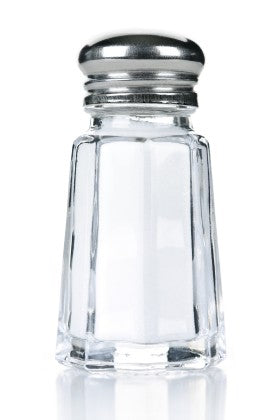FREE SHIPPING On Cont. U.S. Orders Over $79

The Salty Lie: Is Your Daily Salt Intake Really Too Much?
Salt has been vilified and misunderstood for years. This is due to the country being filled with sedentary, obese people. Fit people are now also burdened with their issues, despite having no impact on us.
In fact, in January, 2010, New York Mayor Bloomberg moved to reduce the amount of salt in restaurants. But what if we need and want salt? What if we are active? What if we are misinforming active people and perhaps even impeding their health and performance by dumbing everything down to the lowest common denominator? The fat, average American?
Related: Should You Fear Sodium and Cholesterol?
Would you vilify something that helps with muscle contraction, nerve function, blood volume, and acid-base balance? How about helping with intracellular and extracellular fluid for joint health? Or even helping avoid dehydration?
And an even more dire statistic, eating too little sodium, less than 2,300mg per day, has been shown in one study to increase your mortality rate - meaning you are more likely to die early than those who have more sodium. So why are people so scared of salt?
 The answer is that we have been told for years that salt causes hypertension. This myth was perpetrated in large part due to doctors observing that those who ate a lot of salt had hypertension coming in part from a French doctor observing that six of his patients had high blood pressure? ate a lot of salt.
The answer is that we have been told for years that salt causes hypertension. This myth was perpetrated in large part due to doctors observing that those who ate a lot of salt had hypertension coming in part from a French doctor observing that six of his patients had high blood pressure? ate a lot of salt.
Silly, huh?
Then Lewis Dahl, who had a perpetual hard-on to make salt the enemy, found that Asian countries that ate a lot of salt had high blood pressure. Even though he never was able to show within a population that salt was the culprit, in 1977 the US Senate?s Select Committee on Nutrition and Human Needs recommended American?s cut their intake by 50-85%.
So for athletes looking for performance and worries about their salt intake, this can affect them quite negatively. Strenuous exercise can deplete 2,000mg sodium per hour. This is a lot of sodium!
While sedentary adults can maintain their health at 200-500mg of sodium daily, as you can see, athletes need much, much more! It is preposterous that the government expects us all to use the same amount of sodium as the mainstream sedentary folks.
The issue isn't sodium intake; it is balancing it with other minerals. Also, in extreme cases athletes can even die from hyponatremia (low blood sodium).
According to a 2011 federal study into sodium and potassium intake, those at greatest risk of cardiovascular disease were those who got a combination of too much sodium along with too little potassium. There are theories that our ancient ancestors got about 16x more potassium than sodium, but that's excessive. All we need to do to ensure balance is:

Thus, while it might temporarily make you look leaner, it isn't a long term strategy.
Your body likes to regulate, or in other words maintain homeostasis. So if you keep your sodium low or high, your body will recognize that and adapt to it. So by keep sodium extremely low, you might not realize the long term leaner look you?re going for.
Salt your food to taste, and if you salt your food, use natural salt like sea salt or Himalayan pink salt. If you?re an athlete, replace sodium and potassium as needed around training if you sweat a lot.
Common sense is a great thing. Enjoy salt and remember, preventing hyponatremia is not a game!
In fact, in January, 2010, New York Mayor Bloomberg moved to reduce the amount of salt in restaurants. But what if we need and want salt? What if we are active? What if we are misinforming active people and perhaps even impeding their health and performance by dumbing everything down to the lowest common denominator? The fat, average American?
Related: Should You Fear Sodium and Cholesterol?
Would you vilify something that helps with muscle contraction, nerve function, blood volume, and acid-base balance? How about helping with intracellular and extracellular fluid for joint health? Or even helping avoid dehydration?
And an even more dire statistic, eating too little sodium, less than 2,300mg per day, has been shown in one study to increase your mortality rate - meaning you are more likely to die early than those who have more sodium. So why are people so scared of salt?
One study linked low sodium intake to an early death.
Does Salt Cause Hypertension for Athletes?
 The answer is that we have been told for years that salt causes hypertension. This myth was perpetrated in large part due to doctors observing that those who ate a lot of salt had hypertension coming in part from a French doctor observing that six of his patients had high blood pressure? ate a lot of salt.
The answer is that we have been told for years that salt causes hypertension. This myth was perpetrated in large part due to doctors observing that those who ate a lot of salt had hypertension coming in part from a French doctor observing that six of his patients had high blood pressure? ate a lot of salt.Silly, huh?
Then Lewis Dahl, who had a perpetual hard-on to make salt the enemy, found that Asian countries that ate a lot of salt had high blood pressure. Even though he never was able to show within a population that salt was the culprit, in 1977 the US Senate?s Select Committee on Nutrition and Human Needs recommended American?s cut their intake by 50-85%.
So for athletes looking for performance and worries about their salt intake, this can affect them quite negatively. Strenuous exercise can deplete 2,000mg sodium per hour. This is a lot of sodium!
While sedentary adults can maintain their health at 200-500mg of sodium daily, as you can see, athletes need much, much more! It is preposterous that the government expects us all to use the same amount of sodium as the mainstream sedentary folks.
The issue isn't sodium intake; it is balancing it with other minerals. Also, in extreme cases athletes can even die from hyponatremia (low blood sodium).
The Sodium-Potassium Pump
The sodium-potassium pump is the process of moving sodium and potassium ions across the cell membrane. It is an active transport process involving the hydrolysis of ATP to provide the necessary energy. Basically, we need to make sure potassium and sodium are both balanced within the body.According to a 2011 federal study into sodium and potassium intake, those at greatest risk of cardiovascular disease were those who got a combination of too much sodium along with too little potassium. There are theories that our ancient ancestors got about 16x more potassium than sodium, but that's excessive. All we need to do to ensure balance is:
- DO NOT use table salt. Natural sea salt, Himalayan pink salts and other natural salts contain many minerals, not just sodium.
- Avoid processed foods which usually have a lot of plain salt and not a lot of potassium.
- Eat a variety of whole, natural foods, and a lot of vegetables. Even potatoes are packed with potassium!

Cutting Sodium to Look Leaner
It might temporarily help. If you have too much salt, you might have temporary water weight gain. If you cut sodium intake down, you might temporarily lose weight. But this is NOT fat loss, it is simply intracellular and extracellular water weight.Thus, while it might temporarily make you look leaner, it isn't a long term strategy.
Your body likes to regulate, or in other words maintain homeostasis. So if you keep your sodium low or high, your body will recognize that and adapt to it. So by keep sodium extremely low, you might not realize the long term leaner look you?re going for.
The Bottom Line
It is all about moderation. While we don't need to purposely deprive ourselves of salt, we don't need to overindulge.Salt your food to taste, and if you salt your food, use natural salt like sea salt or Himalayan pink salt. If you?re an athlete, replace sodium and potassium as needed around training if you sweat a lot.
Common sense is a great thing. Enjoy salt and remember, preventing hyponatremia is not a game!






